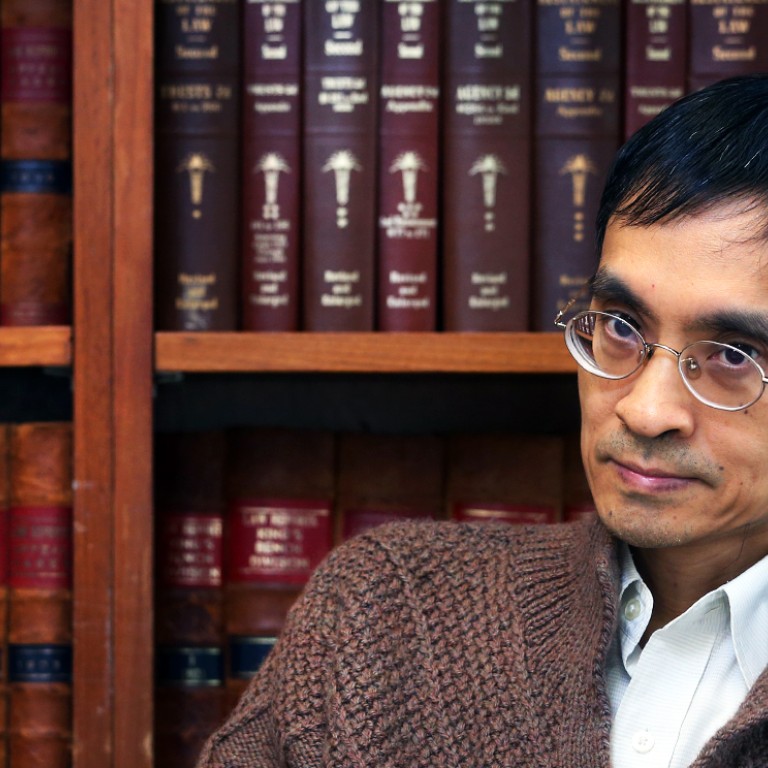
Calls for Hong Kong national security law shot down by legal expert Albert Chen
Chief executive Leung Chun-ying confirms government has no plans to revisit controversial Article 23 of Basic Law
A member of the top-level Basic Law Committee has quashed suggestions that the mainland’s tough national security laws should be applied to Hong Kong in the wake of Occupy Central protests.
Professor Albert Chen Hung-yee was responding to an unexpected idea from Stanley Ng Chau-pei, chairman of the Federation of Trade Unions and a National People’s Congress deputy, who said yesterday that he and other NPC members would suggest incorporating the national laws into the city’s mini-constitution in view of the impact of the 79-day civil disobedience movement.
Article 23 of the Basic Law requires the city to pass legislation prohibiting acts of “treason, secession, sedition, or subversion”. But an earlier attempt to pass an Article 23 law was scrapped after half a million people took to the streets to protest in 2003, prompting an indefinite suspension.
Chen said there was “no need at this stage to put in place national security laws in addition to Article 23”, adding that the Basic Law draftsmen had not wanted draconian national laws in the constitutional document.
“Mainland China’s national security laws, like secession and treason, are rather stringent and were probably deemed not applicable to Hong Kong when the Basic Law was being drafted,” Chen told a DBC radio programme on Tuesday.
He said it was decided at the time of the drafting that Hong Kong’s legislative body should handle the relevant legislation by itself, “in order to set out laws that respect freedom and human rights”.
Mainland China’s national security laws, like secession and treason, are rather stringent and were probably deemed not applicable to Hong Kong when the Basic Law was being drafted
The NPC Standing Committee must consult the Basic Law Committee before it decides to add or remove from the list of national laws applied in Hong Kong.
Speaking ahead of the weekly Executive Council meeting on Tuesday, Chief Executive Leung Chun-ying said he did not know the details of Ng’s suggestion and reiterated that the government had no plan to try and enact a national security law in the city.
READ MORE: CY Leung was right to criticise students, says former chief executive Tung Chee-hwa
“The SAR government is not looking into the issue nor does it have any plan to move for the legislation in accordance with Article 23 of the Basic Law,” Leung said.
Leung has stated multiple times that he will not address the thorny subject of Article 23 during the rest of his first term in office.
Public anger against attempts by the government of former chief executive Tung Chee-hwa to enact Article 23 reached a climax on July 1, 2003, as half a million Hongkongers took to the streets. It was, and still is the biggest rally ever held in the city and was believed to be one of the triggers for Tung’s eventual resignation in 2005.
Chen, who is also a legal scholar at the University of Hong Kong, added that only in the event that Article 23 was vetoed should the national security laws be considered, due to certain conflicts that exist between the two.
The NPC Standing Committee is currently reviewing the second draft of a counter-espionage law, which will replace the existing national security law.
The law would mean foreign organisations and individuals who conduct spying, or who instigate and sponsor others into committing espionage, would be punished, Xinhua reported in October.
The draft was submitted in October to the NPC Standing Committee for deliberation at the start of its session, Xinhua reported.
It promises to ensure confidentiality regarding state and commercial secrets and personal privacy during investigations.
The national security law, which came into effect in 1993, mainly regulates the work of the country’s national security agencies, whose major duty is counter-espionage.

